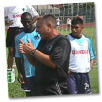Trivialization of Training
Just because you are an elite athlete do you really need a stretching coach, a strength coach, a massage therapist, a technique coach, a speed coach and a conditioning coach? I came a across an article about an elite athlete the other day who was taking this approach. This is actually quite common. Isn’t this a little over the top? I wonder if they all have certifications for their specialties. From a practical standpoint how do you connect all of these? Who is the captain of this ship? In the instances where I have seen this none of the specialists are communicating with each other on a regular basis, therefore what you really have is total confusion, not solid training. Somehow this model has taken hold and each athlete has a posse of specialists. I witnessed this first hand a couple of years ago where the athletes where getting therapy several times a day. If that is necessary then there is something with the training. Even at the elite level it is about basics, getting fundamental things done on a consistent basis. When you lose sight of that it is no longer training.


6 Comments:
The key component here is communication between everyone and establishing from the beginning who is the captain!
It can be done but quite difficult to accomplish mostly due to egos.
Hi Vern
I think that if all that makes you the best in the world, then yes, you need it - and often elite athletes *think* they need little things to give them an edge, assuming they aer doing the basics really, really well. I'm thinking here of Paula Radcliffe who not only has a big coaching staff of therapists etc, but wears compression socks, some titanium thingy around her neck to stop her energy draining away...yet she still works with her coach from her teenage days. For her this group around her has helped her become the best in the world and she marshals them well (I think she is the captain!)How much is placebo effect and how much is provable benefit, it's hard to say, but if she thinks she needs them and she is the best marathoner in the world, she knows best! England won the Rugby World Cup in '03 using exactly that approach - a massive squad of trainers and therapists (including an 'eye speed' coach, I believe) all brilliantly managed by Clive Woodward. Mind you it cost a fortune! (But we won, so it was all worth it!) It's when you don't win, or you aren't doing the basics better than everyone else that these extra coaches are surplus.
Thanks for your great blog, as ever.
Huw, at www'runflux.com
The captain is the athlete communicate with the athlete after all, it is their whole body all said an done, yes? It's understood in the past great coach's were unable to agree with each other, so can we totally rely on them and them alone?
Communication is two way street; sending and receiving.
It is "nice" to have all the specialty coaches, but if they come from different areas/locations. I think it is a bit tough to communicate...to be on the exact same page, exact same paragraph, exact same sentence, et al.
Hi Vern Great post as I have started to believe some players become addicted to physio and treatment. I would be interested for you to talk about this and if you have seen it where the physion becomes God and players are regularly missing sessions due to an ultra conservative physio. Surely the best system is to have the director of Athletic Development oversee all aspects of the program as it just gets back to the fact that too many cooks spoil the broth. Very interested for you to post more on this as this is a definate issue
This comment has been removed by a blog administrator.
Post a Comment
<< Home